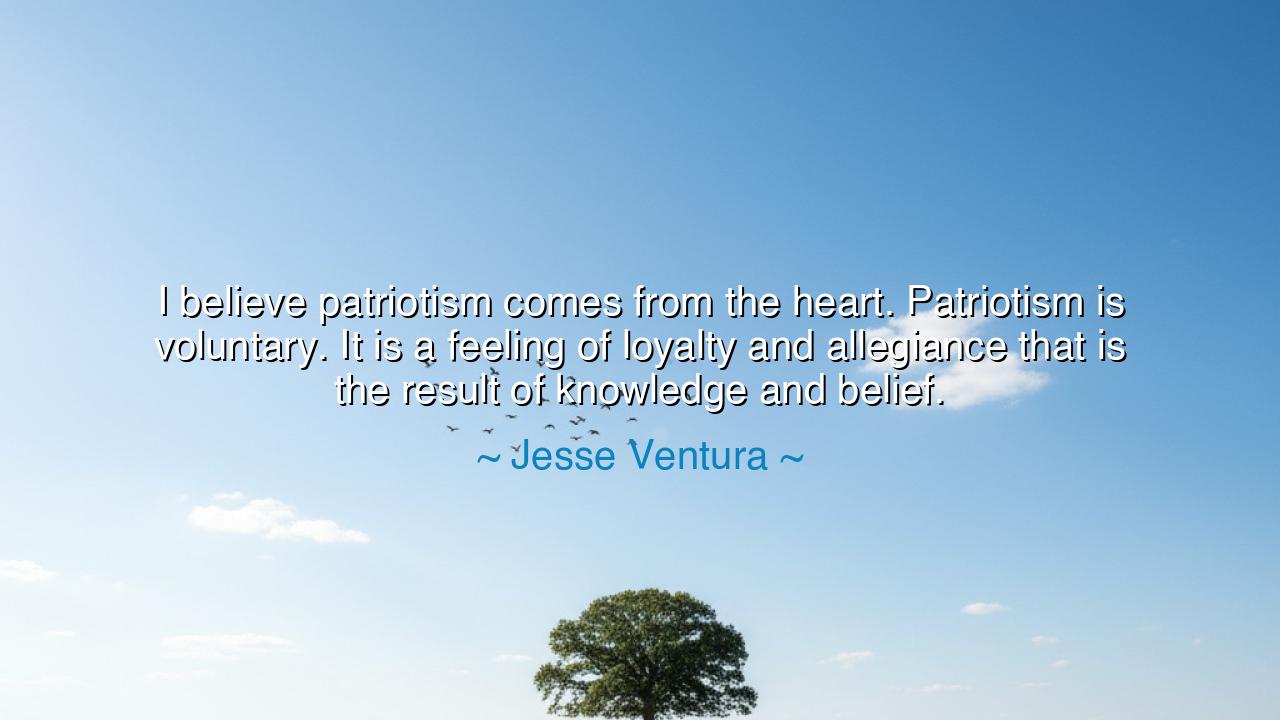
I believe patriotism comes from the heart. Patriotism is
I believe patriotism comes from the heart. Patriotism is voluntary. It is a feeling of loyalty and allegiance that is the result of knowledge and belief.






“I believe patriotism comes from the heart. Patriotism is voluntary. It is a feeling of loyalty and allegiance that is the result of knowledge and belief.” Thus spoke Jesse Ventura, soldier, governor, and son of a nation that has long wrestled with the meaning of love for one’s homeland. His words, though uttered in an age of modern politics, carry the tone of something ancient — an echo of the virtues that once defined honor, duty, and belonging. For Ventura reminds us that patriotism is not the shout of obedience nor the roar of blind pride, but the quiet strength of the soul — a voluntary devotion, born not from fear or force, but from understanding and conviction.
In his words lies a profound distinction: patriotism is not submission, but choice. It is not demanded by rulers nor decreed by law; it rises freely, like a spring from the depths of the human heart. A nation may compel service, but it cannot compel love. The truest form of allegiance is that which grows from knowledge and belief — from knowing one’s country deeply, both its greatness and its flaws, and believing still in its capacity to rise toward the good. Ventura speaks, therefore, not to the blind worship of a flag, but to the enlightened faith of a citizen who understands what his homeland truly stands for.
In this, Ventura’s spirit reflects that of the ancient republics, where citizenship was sacred because it was chosen. The Greeks spoke of philotimo — the love of honor and duty — a patriotism that came not from command, but from the inner flame of virtue. The Romans, too, revered pietas, the moral devotion to one’s gods, family, and country, born of understanding one’s place within the great order of things. So too does Ventura, in his modern way, remind us that patriotism is not a reaction of passion, but a reasoned reverence. It is the fruit of wisdom — of knowing what one serves and why.
Consider the story of George Washington, who might easily have crowned himself king after victory in the Revolution. The army adored him; the people would have accepted his rule. Yet, because he loved his country more than his ambition, he chose to relinquish power. His patriotism did not demand control, but sacrifice. It came from the heart — a free act of loyalty to an idea greater than himself. Washington’s knowledge of what tyranny could bring, and his belief in the fragile promise of liberty, guided him. He embodied Ventura’s truth: that patriotism rooted in conscience, not command, is the only kind that endures.
Ventura’s words also carry a warning. For in every age, there are those who would confuse patriotism with propaganda, who would measure loyalty by volume rather than by virtue. They cry “love of country” while sowing hatred among its people, forgetting that the heart cannot love what it does not understand. Such patriotism is hollow — a noise without substance, a banner without belief. The patriot Ventura describes is not the one who obeys without question, but the one who questions because he loves. True loyalty is not silence; it is the courage to demand that the nation live up to its highest ideals.
Thus, the knowledge and belief of which he speaks are not passive things. They require effort — to learn the history of one’s land, to understand its principles, to see its triumphs and its wounds alike. A patriot who knows only pride knows nothing; but one who knows the struggles of their people, the sacrifices of those who built the nation, and the injustices still to be mended, loves more deeply. For knowledge gives weight to allegiance, and belief gives it purpose. From such roots grows the kind of patriotism that strengthens rather than divides — the kind that heals rather than harms.
So, my listener, take this teaching to heart: let your patriotism be chosen, not imposed; let it be born of understanding, not ignorance; let it seek truth, not comfort. Study your country — its history, its heroes, and its failings — and from that knowledge, shape a loyalty that is firm but just, proud but humble. Love your land not because it is perfect, but because it strives to be. In doing so, you will become not merely a citizen, but a guardian of its spirit.
For as Ventura teaches, patriotism that comes from the heart cannot be conquered. It does not depend on flags or slogans, for it lives in the choices of each soul who dares to love wisely. Such love does not divide — it unites. It does not blind — it enlightens. And when a nation is filled with such hearts, it is not merely powerful; it is worthy of its people.






AAdministratorAdministrator
Welcome, honored guests. Please leave a comment, we will respond soon